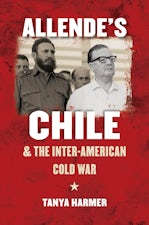On Our Own Terms
Development and Indigeneity in Cold War Guatemala
By Sarah Foss
334 pp., 6.125 x 9.25, 20 halftones, 1 map
-
Paperback ISBN: 978-1-4696-7033-1
Published: November 2022 -
E-book PDF ISBN: 979-8-8908-6246-4
Published: November 2022 -
Hardcover ISBN: 978-1-4696-7032-4
Published: November 2022 -
E-book EPUB ISBN: 978-1-4696-7034-8
Published: November 2022
New Cold War History
Buy this Book
- Paperback $29.95
- Hardcover $99.00
- E-Book $22.99
For Professors:
Free E-Exam Copies
Sarah Foss illustrates how this process transpired in Cold War Guatemala, spanning democratic revolution, military coups, and genocidal civil war. Drawing on previously unused sources such as oral histories, anthropologists' field notes, military records, municipal and personal archives, and a private photograph collection, Foss analyzes the uses and consequences of development and its relationship to ideas about race from multiple perspectives, emphasizing its historical significance as a form of intervention during the Cold War.
About the Author
Sarah Foss is assistant professor of history at Oklahoma State University.
For more information about Sarah Foss, visit
the
Author
Page.
Reviews
“An extensively researched and thoughtful volume. . . . a necessary intervention in how we examine development, as it moves away from a focus on policy and toward how development was implemented, contested, and negotiated on the ground.”—Hispanic American Historical Review
“Creatively researched and thoughtfully written and analysed, On Our Own Terms is a welcome contribution to the historiography of the Cold War in Guatemala.”—Journal of Latin American Studies
“Excellent. In this well-researched book . . . Foss shows readers how states used development to forge a politically useful populace. On Our Own Terms is a praiseworthy contribution.”—Journal of Social History
“An innovative study of Cold War-era development projects in rural Guatemala. . . . Foss skillfully weaves a chronological narrative that spans significant national, regional, and global shifts, integrating them into her history with such grace that her reader might overlook this accomplishment.”—The Americas
“A pivotal contribution to the study of development and Indigenous history in Guatemala. Foss’s account places Indigenous communities at the center of the global Cold War, revealing them as purposive participants in development initiatives over a half-century of Guatemalan history.” —A Contracorriente
"Foss offers a crucial window into twentieth-century Guatemalan history and the Latin American Cold War and sheds new light on the continuities and discontinuities in imaginations of citizenship, modernization, and nation."—Julie Gibbings, author of Our Time Is Now: Race and Modernity in Postcolonial Guatemala



